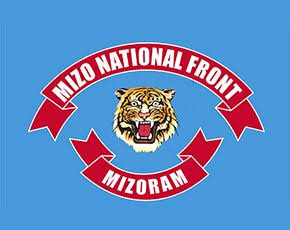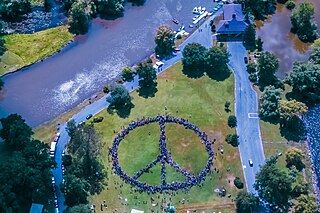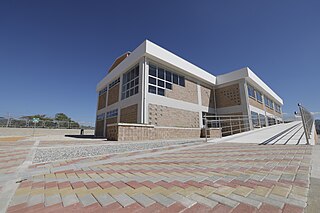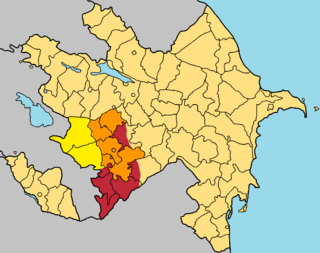Related Research Articles

Peacekeeping comprises activities, especially military ones, intended to create conditions that favor lasting peace. Research generally finds that peacekeeping reduces civilian and battlefield deaths, as well as reduces the risk of renewed warfare.

Syama Prasad Mookerjee was an Indian barrister, educationist, politician, activist, social worker, and a minister in the state and national governments. Noted for his opposition to Quit India movement within the independence movement in India, he later served as India's first Minister for Industry and Supply in Prime Minister Jawaharlal Nehru's cabinet after breaking up with the Hindu Mahasabha. After falling out with Nehru, protesting against the Liaquat–Nehru Pact, Mukherjee resigned from Nehru's cabinet. With the help of the Rashtriya Swayamsevak Sangh, he founded the Bharatiya Jana Sangh, the predecessor to the Bharatiya Janata Party, in 1951.

Heydar Alirza oghlu Aliyev was an Azerbaijani politician who was a Soviet party boss in the Azerbaijan Soviet Socialist Republic from 1969 to 1982, and the third president of Azerbaijan from October 1993 to October 2003.

A peace treaty is an agreement between two or more hostile parties, usually countries or governments, which formally ends a state of war between the parties. It is different from an armistice, which is an agreement to stop hostilities; a surrender, in which an army agrees to give up arms; or a ceasefire or truce, in which the parties may agree to temporarily or permanently stop fighting.
Conflict resolution is conceptualized as the methods and processes involved in facilitating the peaceful ending of conflict and retribution. Committed group members attempt to resolve group conflicts by actively communicating information about their conflicting motives or ideologies to the rest of group and by engaging in collective negotiation. Dimensions of resolution typically parallel the dimensions of conflict in the way the conflict is processed. Cognitive resolution is the way disputants understand and view the conflict, with beliefs, perspectives, understandings and attitudes. Emotional resolution is in the way disputants feel about a conflict, the emotional energy. Behavioral resolution is reflective of how the disputants act, their behavior. Ultimately a wide range of methods and procedures for addressing conflict exist, including negotiation, mediation, mediation-arbitration, diplomacy, and creative peacebuilding.

Pranab Kumar Mukherjee was an Indian politician who served as the 13th president of India from 2012 until 2017. He was the first person from West Bengal to hold the post of President of India. In a political career spanning five decades, Mukherjee was a senior leader in the Indian National Congress and occupied several ministerial portfolios in the Government of India. Prior to his election as President, Mukherjee was Finance Minister from 2009 to 2012. He was awarded India's highest civilian honour, the Bharat Ratna, in 2019, by his successor as president, Ram Nath Kovind.
The First Ivorian Civil War was a civil conflict in the Ivory Coast that began with a military rebellion on 19 September 2002 and ended with a peace agreement on 4 March 2007. The conflict pitted the government of Ivorian President Laurent Gbagbo against a domestic insurgency led by the New Forces of Ivory Coast. Following the war, a second civil war (2010–2011) would begin over the results of the 2010 Ivorian presidential election.
Intermittent discussions are held by various parties and proposals put forward in an attempt to resolve the Israeli–Palestinian conflict through a peace process. Since the 1970s, there has been a parallel effort made to find terms upon which peace can be agreed to in both this conflict and the wider Arab–Israeli conflict. Notably, the Camp David Accords between Egypt and Israel included discussions on plans for "Palestinian autonomy", but did not include any Palestinian representatives. The autonomy plan would later not be implemented, but its stipulations would to a large extent be represented in the Oslo Accords.

The Mizo National Front is a regional political party in Mizoram, India. MNF emerged from the Mizo National Famine Front, which was formed by Pu Laldenga to protest against the inaction of the Government of India towards the famine situation in the Mizo areas of the Assam state in 1959. It staged a major uprising in 1966, followed by years of underground activities. In 1986, it signed the Mizoram Accord with the Government of India, renouncing secession and violence. The MNF then began contesting elections and has formed state government in Mizoram three times. It is currently the state's opposition party, with its president, Zoramthanga, as the Former Chief Minister of Mizoram.

Peace and conflict studies is a social science field that identifies and analyzes violent and nonviolent behaviors as well as the structural mechanisms attending conflicts, to understand those processes which lead to a more desirable human condition. A variation on this, peace studies, is an interdisciplinary effort aiming at the prevention, de-escalation, and solution of conflicts by peaceful means, based on achieving conflict resolution and dispute resolution at the international and domestic levels based on positive sum, rather than negative sum, solutions.
The Sierra Leonean Civil War (1991–2002) was a civil war in Sierra Leone that began on 23 March 1991 when the Revolutionary United Front (RUF), with support from the special forces of Liberian dictator Charles Taylor's National Patriotic Front of Liberia (NPFL), intervened in Sierra Leone in an attempt to overthrow the Joseph Momoh government. The resulting civil war lasted almost 11 years, and had over 50,000, up to 70,000, casualties in total; an estimated 2.5 million people were displaced during the conflict, and widespread atrocities occurred.

Realism, a school of thought in international relations theory, is a theoretical framework that views world politics as an enduring competition among self-interested states vying for power and positioning within an anarchic global system devoid of a centralized authority. It centers on states as rational primary actors navigating a system shaped by power politics, national interest, and a pursuit of security and self-preservation.
Peace education is the process of acquiring values, knowledge, attitudes, skills, and behaviors to live in harmony with oneself, others, and the natural environment.

Peacebuilding is an activity that aims to resolve injustice in nonviolent ways and to transform the cultural and structural conditions that generate deadly or destructive conflict. It revolves around developing constructive personal, group, and political relationships across ethnic, religious, class, national, and racial boundaries. The process includes violence prevention; conflict management, resolution, or transformation; and post-conflict reconciliation or trauma healing before, during, and after any given case of violence.

Global Peace Index (GPI) is a report produced by the Australia-based NGO Institute for Economics & Peace (IEP) which measures the relative position of nations' and regions' peacefulness. The GPI ranks 163 independent states and territories according to their levels of peacefulness. In the past decade, the GPI has presented trends of increased global violence and less peacefulness.
The first Christmas Day plot was a conspiracy made by the Indian revolutionary movement in 1909: during the year-ending holidays, the Governor of Bengal organised a ball at his residence in the presence of the Viceroy, the Commander-in-Chief and all the high-ranking officers and officials of the Capital (Calcutta). The 10th Jat Regiment was in charge of the security. Followers of Jatindranath Mukherjee, its soldiers decided to blow up the ballroom and take advantage of destroying the colonial Government. In keeping with his predecessor Otto von Klemm, a friend of Lokmanya Tilak, on 6 February 1910, M. Arsenyev, the Russian Consul-General, wrote to St Petersburg that it had been intended to "arouse in the country a general perturbation of minds and, thereby, afford the revolutionaries an opportunity to take the power in their hands." According to R. C. Majumdar, "The police had suspected nothing and it is hard to say what the outcome would have been had the soldiers not been betrayed by one of their comrades who informed the authorities about the impending coup".

Education in Guatemala is under the jurisdiction of the Ministry of Education which oversees formulating, implementing and supervising the national educational policy. According to the Constitution of Guatemala, education is compulsory and free in public schools for the initial, primary and secondary levels. There is a five-tier system of education starting with primary school, followed by secondary school and tertiary education, depending on the level of technical training.

The Madrid Principles were proposed peace settlements of the Nagorno-Karabakh conflict, proposed by the OSCE Minsk Group. The OSCE Minsk Group was the only internationally agreed body to mediate the negotiations for the peaceful resolution of the conflict prior to the renewed outbreak of hostilities in 2020. Senior Armenian and Azerbaijani officials had agreed on some of the proposed principles but made little or no progress towards the withdrawal of Armenian forces from occupied territories or towards the modalities of the decision on the future Nagorno-Karabakh status.
Kurdish-Turkish peace initiatives, there were several, since the conflict with the Kurdistan Workers' Party began in 1978. Some were successful, others not. But the first real approach to the Kurdish question in Turkey came after the Government of Turgut Özal decided to end the policy of denial of the Kurds and allow the Kurdish language to be spoken in 1991 and later on in the same year also to be broadcast.

Border disputes of Northeast India mainly include inter-state conflict between Assam–Mizoram, Assam–Arunachal Pradesh, Assam–Nagaland and Assam–Meghalaya. The disputes, including clashes between rival police forces, have resulted in the loss of life, livelihood and property. The border disputes in some cases are part of the larger national (separatist), sub-regional and ethnic conflicts, as well as criminal enterprise fuelled. This internal land conflict in the districts of the northeast are part of the 322 districts affected by ongoing land conflicts out of a total of 703 districts in India.
References
- ↑ Andersson & Mukherjee 2019, p. 1, 3.
- ↑ Andersson & Mukherjee 2019, pp. 2, 3.
- ↑ Aliyev 2019, p. 1.
- 1 2 Ginty, Muldoon & Ferguson 2007, p. 2.
- ↑ Beloff 1949, p. 220.
- ↑ Ginty 2016, p. 2.
- 1 2 Ginty 2016, p. 3.
- ↑ Ginty 2016, p. 13.
- ↑ Ginty, Muldoon & Ferguson 2007, p. 9.
- Bibliography
- Andersson, Tommy; Mukherjee, Conan (2021-04-03). "Seeking No War, Achieving No Peace: The Conflict over the Siachen Glacier" . Defence and Peace Economics. 32 (3): 253–270. doi:10.1080/10242694.2019.1660839. hdl: 10419/260243 . ISSN 1024-2694. S2CID 159017612.
- — Andersson, Tommy; Mukherjee, Conan (February 2019). "Seeking no War, Achieving no Peace" (PDF). Indian Institute of Management Calcutta, Working Paper Series. Retrieved 16 September 2021– via Indian Institute of Management Calcutta (IIM-C) (free access).
- Ginty, Roger Mac (2016). No War, No Peace: The Rejuvenation of Stalled Peace Processes and Peace Accords. Palgrave Macmillan. Springer. ISBN 9780230625686 – via Google Books. (Limited preview)
{{cite book}}: CS1 maint: postscript (link) - Ginty, Roger Mac; Muldoon, Orla T.; Ferguson, Neil (2007). "No War, No Peace: Northern Ireland after the Agreement". Political Psychology. 28 (1): 1–11. doi:10.1111/j.1467-9221.2007.00548.x. ISSN 0162-895X. JSTOR 20447017.
- Beloff, Max (1949). "No Peace, No War". Foreign Affairs. 27 (2): 215–231. doi:10.2307/20030176. ISSN 0015-7120. JSTOR 20030176.
- Aliyev, Huseyn (2019), 'No peace, no war' proponents? How pro-regime militias affect civil war termination and outcomes (PDF), core.ac.uk: University of Glasgow